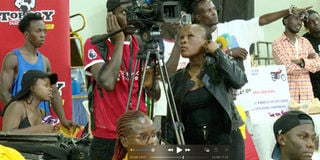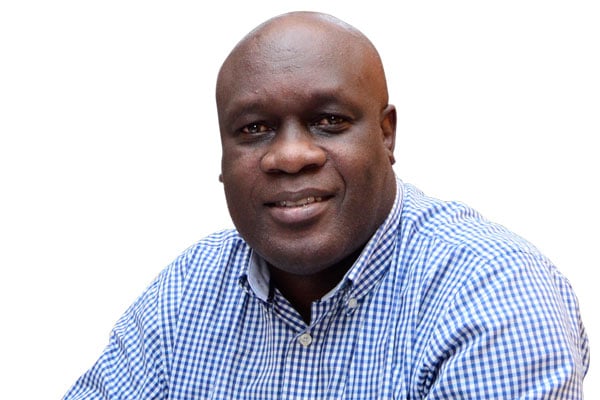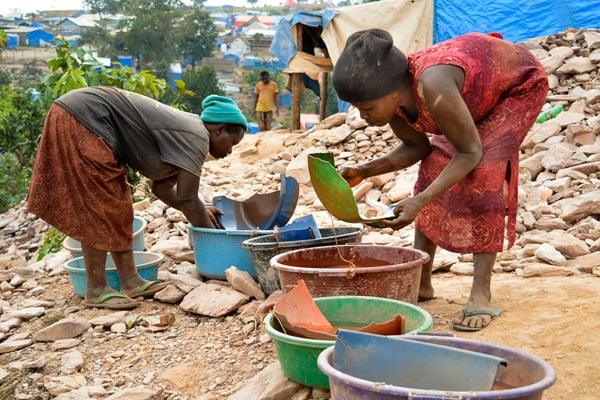Why female journalists don’t stay longer in the newsroom

Nicole Apio during a boxing event at Lugogo Indoor Stadium in Kampala recently. PHOTO | ARNOLD SEREMBA
What you need to know:
- The number of female sports journalists continues to rise in newsrooms. However, as is the case with other female reporters in the profession, they never last long in the newsroom. Sharifah Nambi spoke to two female broadcast sports journalists who are working their way to the top.
In the wee hours of last Saturday, Nicole Apio was among the few sports journalists who witnessed Lukanga Boxing Club win the 2024 National Boxing Open Championship. She was the only female journalist covering the event that had drawn hundreds of fans from all walks of life.
Apio is not only a sports reporter. She also hosts the weekly Fan Zone show every Sunday on NBS TV. Sports journalism is still heavily male-dominated, but Apio – who was raised in Acholi Quarters, a slum in Kampala City predominantly occupied by people who were displaced by the Lord’s Resistance Army war in northern Uganda – has tackled it head-on.
She faced adversity at a young age when her father abandoned the family before she and her twin brother were born. Her mother worked as a house help to fend for the family.
Entering the sports world
Being the only woman covering sports events is the norm for Apio. She joined Next Media Services as a sports reporter in 2019. At 5pm, while other mothers leave their offices in a rush, to bond with their families, Apio, who is a mother of a two-year-old son, is getting ready to cover football or boxing games that end in the night or the early morning.
“I was desperate to work in broadcast media and I had applied to many media houses, in vain. When an opening came up on NBS Sports, I adjusted my outlook and accepted it. I did not want to do sports journalism; I just wanted to be employed because I was tired of sitting at home,” Apio says.
Apio, who studied at St Joseph Primary School Kireka, Crane High School, and Uganda Institute of Business and Media Studies, had had a chance to intern at the national broadcaster.
For the first five months, working as a sports journalist with almost no in-depth knowledge about the sports she was covering was a challenge.
“No one believed a woman could understand and cover sports. Some editors looked down on me and at one point, I took to reciting my resignation letter in my head. Going to the field means running up and down, and when it is football, I have to tolerate every insult. Fans get emotional when they lose a match and they would abuse me just because I asked for an interview,” she recalls.
However, life eased a little when in April 2019, she attended the International Young Reporters Program in Italy, sponsored by the International Sports Press Association (AIPS).
Women in sports journalism face an uphill battle when it comes to creating a niche for themselves in the world of sports. Almost everyday, they deal with colleagues who ignore them, sportsmen who humiliate them and fans that insult them openly.
“Just recently, in the Uganda Premier League games, I was covering a match between Vipers Sports Club and Kitara Football Club in Masindi District. After Kitara lost the match, I started interviewing a few people. A fan rushed at me from behind and lifted his hand to slap me. I was saved by the source I was interviewing. I called my mother. I told her, ‘Kino kizubuwadde. Sikyange.’ (This has become difficult. I cannot identify with it). Then, I burst into tears,” Apio narrates.
Stereotyping
The experiences of Grace Kemigisa, who has been a sports journalist at Uganda Broadcasting Corporation for three years, resonate with Apio’s.
“I joined UBC as an intern, however, after discussing some sports events with my colleagues, I was moved to the sports desk. Not everyone in the newsroom was happy. Many waited for me to fail. People sent messages to my editor, some of which read, ‘That girl is too young.’ ‘Her knowledge of sports is too shallow.’ ‘She will fail you,’” Kemigisa says
Even though her guardians never said it, Kemigisa noticed that they were becoming uncomfortable with her returning home late in the night almost every day. Eventually, she decided to move out.
Two months ago, Apio lost her marriage after failing to handle the pressure from her husband who could not understand why she worked at night.
“He was a violent man. I used to wear sunglasses at work to cover the bruises after he battered me and pretended I was OK. If he saw me reporting live on TV, he would understand. But, if I was just recording a game, I always had to explain why I was late,” she says.
Sexual harassment is almost a fixture in the sports field. Female journalists report harassment from federation officials, players, and fans.
“The players make sexist comments about your body, with some sending late-night messages. It is a complicated situation because if you tell them off sternly, you will never be able to interview them again. And yet, you need those interviews to remain in the profession,” Apio says.
Kemigisa adds that some sports officials decline to give female journalists information, saying they are not the right people to receive it.
“I remember when Patrice Mostepe, the president of the Confederation of African Football (CAF), was coming to Kampala, I called one of the officials organising his visit for an interview. He told me he would get back to me. He never did. Later, he called my bosses and asked them to send another reporter. He was very specific about them sending a male journalist. I was hurt. But I had to bear it,” she says.
Persevering in the face of challenges
Despite all the challenges they encounter, female journalists are still persevering in the field, bringing the biggest stories in sports to our living rooms. It is not all gloom.
At the monthly Uganda Sports Press Association (USPA) assembly in July 2023, Apio scooped the best-broadcast award.
“I do not regret being a sports journalist. Using my first salary, I renovated my family’s old home in Acholi Quarters. One of the high points of my career was covering the visit of UEFA President Aleksander Ceferin, to Uganda. He also visited Acholi Quarters. I encourage young women to pursue sports reporting,” Apio says.
For both Kemigisa and Apio, traveling the continent to cover sports events has been the highlight of their career.




